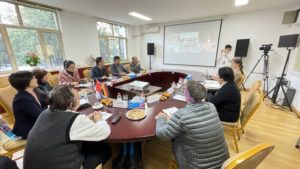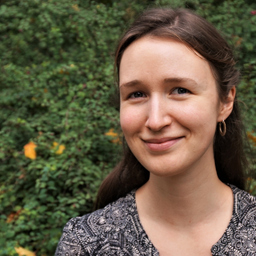On 21 October the DCZ hosted a hybrid workshop on Sino-German cooperation in the seed sector. The event was attended by several representatives from both government and industry associations of the seed sector from China and Germany (namely the PVP Office, CNSTA, CNSA as well as the BSA, BDP and GAA).
The purpose of the meeting was to identify fields of mutual interests in the light of the recent state of the art of research and existing collaboration. This workshop was also a follow-up of a previous workshop on seeds in 2019; however, as DCZ managing director Jürgen Ritter emphasised, in the meantime the seed topic gained significant importance in China, underlined by several policy documents like the 2021 Document No.1 and the Seed Revitalisation Action Plan as well as by the launch of the Nanfang Breeding Research Center. Mr. HU Yan’an from the Foreign Economic Cooperation Center (FECC), the Chinese partner of the DCZ, also referred to the National strategic priority of increasing China’s competitiveness in the seed sector and expressed hope to continue the practical cooperation between both countries in the spirit of openness and transparency.
 In the first session, the representatives from both countries’ government offices responsible for plant varieties gave an introduction to their department and their respective country’s seed strategy. Mr. ZHANG Ximing, Division Director in the Plant Variety Protection (PVP) Office under the Ministry of Agriculture and Rural Affairs (MARA) presented the administrative system for approving new varieties. As of 2020, the list of officially approved titles in China comprises over 16508 varieties. Furthermore, there were also 43 approved applications received from German companies. Besides the current revisions of the Chinese seed law and regulations on the protection of new varieties of plants, the PVP is also working on how to safeguard variety rights and fighting infringements of protected varieties while collaborating with several countries. Ms Friedhilde Trautwein, Head of Section, National and International Variety and Seed Affairs and Coordination Centre for the Ministry of Food and Agriculture in the Bundessortenamt (BSA), also named securing plant breeders’ rights for certain plant varieties as one of the BSA main tasks. Furthermore, the BSA is also involved in approving varieties for Germany, which is the prerequisite for market access. However, as in the EU breeders can also apply for Community Plant Variety Rights at EU level instead of national country-level admission, applications in German are decreasing. Currently, listed varieties in Germany amount to 3457. Due to the federal system in Germany, seed certification is not in the responsibility of the BSA but is done by the seed certification agencies in the individual German federal states.
In the first session, the representatives from both countries’ government offices responsible for plant varieties gave an introduction to their department and their respective country’s seed strategy. Mr. ZHANG Ximing, Division Director in the Plant Variety Protection (PVP) Office under the Ministry of Agriculture and Rural Affairs (MARA) presented the administrative system for approving new varieties. As of 2020, the list of officially approved titles in China comprises over 16508 varieties. Furthermore, there were also 43 approved applications received from German companies. Besides the current revisions of the Chinese seed law and regulations on the protection of new varieties of plants, the PVP is also working on how to safeguard variety rights and fighting infringements of protected varieties while collaborating with several countries. Ms Friedhilde Trautwein, Head of Section, National and International Variety and Seed Affairs and Coordination Centre for the Ministry of Food and Agriculture in the Bundessortenamt (BSA), also named securing plant breeders’ rights for certain plant varieties as one of the BSA main tasks. Furthermore, the BSA is also involved in approving varieties for Germany, which is the prerequisite for market access. However, as in the EU breeders can also apply for Community Plant Variety Rights at EU level instead of national country-level admission, applications in German are decreasing. Currently, listed varieties in Germany amount to 3457. Due to the federal system in Germany, seed certification is not in the responsibility of the BSA but is done by the seed certification agencies in the individual German federal states.
In the second session, stakeholders from the respective country’s seed industry associations which represent the interests of seed trading and breeding businesses presented their organisations. Ms TIAN Weihong, Secretary General of the Chinese National Seed Trade Association (CNSTA) gave an overview of the CNSTA which has 170 companies as members, over 50% of them being active in import/export, and organises conferences, exhibitions and missions to foreign partners. She emphasised the importance of innovation in seed breeding and international cooperation in germplasm as well as the protection of intellectual property. China currently aims to decrease its import ratio, which is in seeds still higher than exports. Currently, the authorisation process for approval of new varieties is being streamlined and allows online approval. Furthermore, it was pointed out that the new – upcoming – Seed Law will also include a section on “essentially derived varieties” (EDV) which will help fighting the exploitation of minor mutations of protected varieties by others than the holder of the initial variety rights. From the German seed industry, Mr. Dieter Rücker presented the German Plant Breeders’ Association (BDP) which currently has 130 members – mainly plant breeders and family businesses, but also large, multinational seed trading companies. He described that the most relevant regulatory issues for BDP and its members are the topics of protection of intellectual property and seed legislation. In Germany the government invests in seed breeding R&D of research institutions, however, property rights are only protected in private companies. The BDP hopes that in the future all countries can comply with international seed legislation, such as the OECD Seed System, International Seed Testing Association (ISTA) and International Plant Protection Convention (IPPC), as this would allow free international circulation of seeds while ensuring a fair competition between seed companies. Both sides expressed interest in future Sino-German collaboration and the DCZ will draft a proposal with concrete activities shortly.




